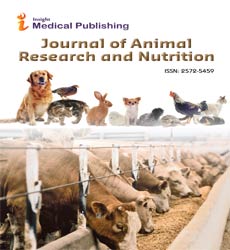Animal Research's Ethical Dimensions and Scientific Advancements
Igor Fondi*
Department of Animal Science, Wageningen University, Wageningen, Netherlands
Published Date: 2023-08-07DOI10.36648/2572-5459.8.4.093
Igor Fondi*
Department of Animal Science, Wageningen University, Wageningen, Netherlands
- *Corresponding Author:
- Igor Fondi
Department of Animal Science,
Wageningen University, Wageningen,
Netherlands,
E-mail: Fondi_i@gmail.com
Received date: July 07, 2023, Manuscript No. IPJARN-23-17841; Editor assigned date: July 10, 2023, PreQC No. IPJARN-23-17841 (PQ); Reviewed date: July 24, 2023, QC No. IPJARN-23-17841; Revised date: July 31, 2023, Manuscript No. IPJARN-23-17841 (R); Published date: August 07, 2023, DOI: 10.36648/2572-5459.8.4.093
Citation: Fondi I (2023) Animal Research's Ethical Dimensions and Scientific Advancements. J Anim Res Nutr Vol.8 No.4: 093
Description
Animal research has played a pivotal role in advancing our understanding of biology, medicine and numerous scientific disciplines. Since the early days of scientific inquiry, animals have been used as models to study various aspects of life, disease and behavior. The practice has led to significant breakthroughs, from the development of life-saving vaccines to the unraveling of intricate genetic mechanisms. However, the use of animals in research has sparked intense ethical debates, as it raises important questions about the rights and welfare of these sentient beings. This essay delves into the multifaceted world of animal research, exploring its historical context, ethical considerations, scientific contributions and the ongoing efforts to strike a balance between scientific progress and animal welfare.
Animal research has deep historical roots, dating back thousands of years. Early civilizations such as the Egyptians, Greeks and Romans employed animals in their medical studies and experiments. These investigations laid the foundation for our understanding of anatomy and physiology. In the middle ages, the practice of vivisection dissecting live animals for scientific purposes became more common, though it was often associated with controversy and limited ethical constraints.
The renaissance era marked a resurgence of scientific inquiry, with figures like Leonardo da Vinci conducting detailed anatomical studies on animals. However, it was not until the 19th century that systematic and controlled experiments on animals became more widespread. The development of the scientific method and the rise of physiology as a discipline prompted a surge in animal experimentation. Claude Bernard, known as the father of modern physiology, championed the use of animals in research and emphasized the importance of experimentation as a scientific tool.
The 20th century saw further expansion of animal research, particularly in the fields of medicine and pharmacology. Milestones such as the discovery of antibiotics and the development of vaccines against deadly diseases like polio were made possible through animal studies. Animals played a critical role in the advancement of medical science during this period. However, these achievements were accompanied by growing ethical concerns about the treatment of animals in research.
Ethical concerns surrounding animal research revolve primarily around questions of animal welfare, suffering and the moral status of animals. These concerns have evolved in response to changing societal attitudes towards animals and ethical frameworks. One of the central ethical considerations in animal research is the welfare of the animals involved. Critics argue that subjecting animals to potentially painful or stressful procedures for the sake of scientific advancement is inherently unethical. They assert that animals should not be used as means to an end and deserve protection from unnecessary harm. The issue of pain and suffering experienced by animals during experiments is a focal point of ethical discussions. Many animals used in research may endure pain, distress, or discomfort as a result of procedures, surgeries, or testing. Critics argue that minimizing or eliminating this suffering should be a top priority.
Debates over the moral status of animals are central to the ethics of animal research. Different ethical frameworks assign varying degrees of moral consideration to animals. Some argue that animals have intrinsic value and deserve rights, while others contend that their moral status is subordinate to that of humans.
Ethical Dimension of Animal Research
Another ethical dimension of animal research involves the exploration of alternatives. Advocates for animal welfare argue that researchers should actively seek alternatives to animal testing, such as in vitro models, computer simulations and human-based research methods, whenever possible.
Many countries and institutions have established ethical oversight committees, such as Institutional Animal Care and Use Committees (IACUCs), to review and approve research involving animals. These committees aim to ensure that research projects meet ethical standards and minimize animal suffering. Despite the ethical concerns, animal research has contributed significantly to scientific knowledge and numerous medical breakthroughs. Some of the key scientific advancements made possible through animal research include:
Animal research has been crucial in the development of vaccines for diseases like polio, measles and hepatitis. Testing vaccines in animals has helped researchers understand their safety and efficacy before human trials. The pharmaceutical industry relies on animal studies to test the safety and efficacyof new drugs. Animal models are used to assess the potential side effects and therapeutic benefits of medications.
Many surgical techniques and procedures have been refined and developed through animal research. These advancements have improved the success rates of surgeries in humans. Animals have served as models for studying various diseases, including cancer, heart disease and neurological disorders. Research on animals has provided insights into disease mechanisms and potential treatment options.
Animal research has been instrumental in unraveling the complexities of genetics and genomics. Studies on animals have contributed to our understanding of inheritance, gene function and genetic diseases. Animal research has shed light on the behavior and psychology of different species, enhancing our understanding of animal cognition, learning, and social interactions.
Studies on animals have also contributed to our understanding of ecosystems, biodiversity and the impact of human activities on the environment. The ethical dilemmas surrounding animal research have prompted efforts to strike a balance between scientific progress and animal welfare. Several approaches and strategies have been developed to address these concerns.
Many countries have established comprehensive regulations and ethical guidelines governing the use of animals in research. These regulations often require researchers to justify the use of animals, minimize suffering and seek alternatives when possible. The development and promotion of alternative research methods, such as in vitro models, tissue cultures, and computer simulations, aim to reduce the reliance on animals in research. Researchers and institutions are increasingly focused on improving the welfare of animals used in research. This includes providing better housing, enrichment and care to minimize stress and suffering.
Raising public awareness about the ethical issues surrounding animal research can lead to greater scrutiny and accountability. Engaging the public in discussions about the moral status of animals and the necessity of research can inform policy decisions. Collaboration among researchers, institutions and animal welfare advocates can foster transparency and ethical accountability in animal research. Training programs for researchers and animal care personnel emphasize the ethical treatment of animals, including techniques to minimize pain and suffering.
Animal research is a complex and multifaceted issue that encompasses both ethical dilemmas and scientific advancements. Throughout history, animals have played a crucial role in expanding our knowledge of biology, medicine and various scientific disciplines. However, this progress has not come without controversy, as ethical concerns regarding animal welfare, suffering and the moral status of animals persist. Efforts to balance scientific progress and animal welfare have led to the development of ethical guidelines, regulations and alternative research methods. The ethical landscape of animal research continues to evolve, reflecting changing societal attitudes towards animals and the recognition of their intrinsic value. Ultimately, the ethical dimensions of animal research challenge us to weigh the potential benefits of scientific advancement against the moral considerations of using sentient beings as research subjects. Finding a harmonious balance between these concerns remains an ongoing endeavor, as we strive to advance science while respecting the welfare and dignity of all living creatures.

Open Access Journals
- Aquaculture & Veterinary Science
- Chemistry & Chemical Sciences
- Clinical Sciences
- Engineering
- General Science
- Genetics & Molecular Biology
- Health Care & Nursing
- Immunology & Microbiology
- Materials Science
- Mathematics & Physics
- Medical Sciences
- Neurology & Psychiatry
- Oncology & Cancer Science
- Pharmaceutical Sciences
